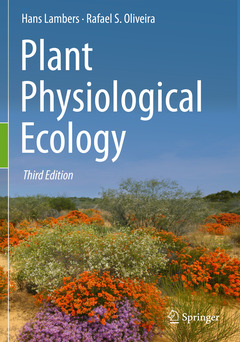Plant Physiological Ecology (3rd Ed., 3rd ed. 2019)
Auteurs : Lambers Hans, Oliveira Rafael S.

Growth, reproduction, and geographical distribution of plants are profoundly influenced by their physiological ecology: the interaction with the surrounding physical, chemical, and biological environments. This textbook highlights mechanisms that underlie plant physiological ecology at the levels of physiology, biochemistry, biophysics, and molecular biology. At the same time, the integrative power of physiological ecology is well suited to assess the costs, benefits, and consequences of modifying plants for human needs and to evaluate the role of plants in natural and managed ecosystems.
Plant Physiological Ecology, Third Edition is significantly updated, with many full color illustrations, and begins with the primary processes of carbon metabolism and transport, plant water relations, and energy balance. After considering individual leaves and whole plants, these physiological processes are then scaled up to the level of the canopy. Subsequent chapters discuss mineral nutrition and the ways in which plants cope with nutrient?deficient or toxic soils. The book then looks at patterns of growth and allocation, life?history traits, and interactions between plants and other organisms. Later chapters deal with traits that affect decomposition of plant material and with the consequences of plant physiological ecology at ecosystem and global levels.
Plant Physiological Ecology, Third Edition features several boxed entries that extend the discussions of selected issues, a glossary, and numerous references to the primary and review literature. This significant new text is suitable for use in plant ecology courses, as well as classes ranging from plant physiology to plant molecular biology.
1. Assumptions and approaches.- 2. Photosynthesis, respiration, and long-distance transport.- 2a. Photosynthesis.- 2b. Respiration.- 2c. Long‑distance transport of assimilates.- 3. Plant water relations.- 4. Plant energy budgets: environmental effects.- 4a. The plant’s energy balance.- 4b. Effects of radiation and temperature level.- 5. Scaling-up gas exchange and energy balance from the leaf to the canopy level.- 6. Mineral nutrition.- 7. Growth and allocation.- 8. Life cycles: environmental influences and adaptations.- 9. Biotic influences.- 9a. Symbiotic associations.- 9b. Ecological biochemistry: allelopathy and defense against herbivores.- 9c. Effects of microbial pathogens.- 9d. Parasitic associations.- 9e. Interactions among plants.- 9f. Carnivory.- 10. Role in ecosystem and global processes.- 10a. Decomposition.- 10b. Ecosystem and global processes: ecophysiological controls.
Hans Lambers is an Emeritus Professor of Plant Biology at the University of Western Australia, in Perth, Australia, and a Distinguished Professor at China Agricultural University, in Beijing, China. He did his undergraduate degree at the University of Groningen, the Netherlands, followed by a PhD project on effects of hypoxia on flooding-sensitive and -tolerant Senecio species at the same institution. From 1979 to 1982, he worked as a postdoc at the University of Western Australia, Melbourne University, and the Australian National University in Australia, working on respiration and nitrogen metabolism. After a postdoc at his alma mater, he became Professor of Ecophysiology at Utrecht University, the Netherlands, in 1985, where he focused on plant respiration and the physiological basis of variation in growth rate amongherbaceous plants. In 1998, he moved to the University of Western Australia, where he focused on plant mineral nutrition, especially in legume crops and native species occurring on severely phosphorus-impoverished soils in a global biodiversity hotspot in southwestern Australia and southeastern Brazil. He has been Editor-in-Chief of the journal Plant and Soil since 1992 and featured on the first ISI list of highly cited authors in the field of animal and plant sciences (since 2002), and on several other ISI lists more recently. He was elected Fellow of the Royal Netherlands Academy of Arts and Sciences in 2003, and Fellow of the Australian Academy of Science in 2012. He received Honorary Degrees from three Universities and from the Academy of Sciences in China.
Rafael S. Oliveira is a Professor of Ecology at the University of Campinas (UNICAMP), Brazil. He did his undergraduate degree at the University of Brasília, Brazil, followed by a PhD on water relations of Amazonian and savanna trees at the University of California, Berkeley, USA. He worked as a postdoc from 2005 to 2007 at the National Institute of Spa
Date de parution : 01-2021
Ouvrage de 736 p.
17.8x25.4 cm
Date de parution : 12-2019
Ouvrage de 736 p.
17.8x25.4 cm



